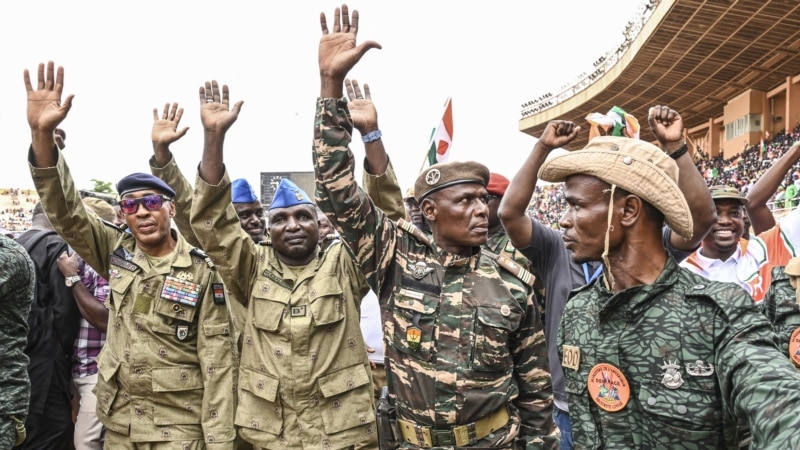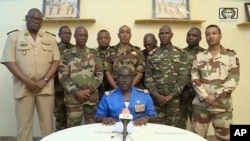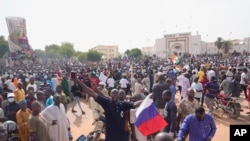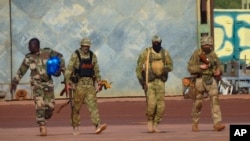Western media amplify Russian propaganda targeting US troops in Niger
On March 16, a spokesperson for Niger’s ruling military junta announced that it had, as Voice of America reported, “revoked, effective immediately, the status of forces agreement that allowed U.S. forces to operate in the country and cooperate with the Nigerien military against militants linked to al-Qaida and the Islamic State terror group.”
U.S. officials say Niger’s decision may have been influenced by Iran and Russia, which are trying to expand their interests in West Africa.
Niger hosts about 1,100 U.S. military personnel and has played a central role in U.S. operations to neutralize al-Qaida- and Islamic State-affiliated terrorist groups in Africa’s Sahel region.
U.S. relations with Niger have deteriorated since the July 2023 military coup that brought the junta to power, however, because of the junta’s human rights violations and the sanctions imposed against Niger for those abuses. Iran and Russia stepped in, with Tehran promising Niger’s junta help in dealing with the sanctions, and Moscow providing military equipment to help it fight various terrorist groups.
Russia has also been using its oversized propaganda machine to spread anti-American sentiment and influence policy making and public opinion in Niger, including by targeting the continued U.S. military presence in the country.
On March 28, Russia’s state-owned Sputnik Africa news agency quoted Niger’s Interior Ministry as saying the United States had promised the previous day “to submit a plan for the ‘disengagement’ of troops from the West African country after Niamey ended its military pact with Washington.”
Pentagon press secretary Major General Pat Ryder dismissed the Sputnik Africa report, describing the Russian outlet untrustworthy.
He added that discussions with Niger are “ongoing”:
“There’s been no decisions made at this stage on the movement of U.S. forces. And we’re still working to get clarification from the CNSP [Nigerien junta] in that regard.”
Russian state media disinformation has been amplified, though, by seemingly independent Western media outlets like New York-based BreakThrough News. While describing itself as fully independent and unbiased, the BreakThrough News team includes at least one journalist who hosted a political talk show at Russia’s Sputnik news agency. The outlet’s tone and sentiments also cast doubt on its impartiality.
On March 25, BreakThrough News posted on its X platform a heavily edited video clip showing cherry-picked portions of a March 21 hearing held by the U.S. House of Representatives’ Armed Services Committee on the U.S. military posture and national security challenges in the greater Middle East and Africa.
BreakThrough News added a comment that distorted the nature of the U.S. mission in Niger and suggested that the decision by Niger’s junta to end the presence of U.S. counterterrorism troops in the country is a fait accompli:
‘’The US gov’t is stunned that Niger is kicking the US military out of the country. Officials from AFRICOM and Rep. Matt Gaetz (FL) express alarm that without the airbase in Niger, the U.S. will not be able to assert its ‘interests’ in Africa.”
That is misleading.
U.S. officials say that while Niger’s ruling military junta revoked the agreement allowing the presence of American troops engaged in counterterrorism, the United States is continuing talks with Nigerien officials, has not withdrawn any of U.S. military personnel from Niger and does not rule out a continued U.S. military presence there.
The Sahel region accounts for 43% percent of the deaths from global terrorism.
On March 26, a spokesman for Niger’s military government, Colonel Amadou Abdramane, announced it was suspending the agreement with the United States on the presence of American counterterrorism forces “with immediate effect.”
But various U.S. officials told Voice of America’s national security correspondent Jeff Seldin that Washington is in direct communication with Niger’s government and does not rule out a continued military partnership.
On March 13, the Africa Center for Strategic Studies, founded and funded by the U.S. government, released a report titled “Mapping a Surge of Disinformation in Africa,” which documented 80 Russia-sponsored disinformation campaigns targeting more than 22 countries.
“These 80 campaigns have reached millions of users through tens of thousands of coordinated fake pages and posts. Aggressively leveraging disinformation is a mainstay of Russia’s use of irregular channels to gain influence in Africa,’’ the report said.
It added: “Russia has promulgated disinformation to undermine democracy in at least 19 African countries, contributing to the continent’s backsliding on this front.”
On February 27, The Royal United Services Institute, or RUSI, a U.K.-based defense and security think tank, reported that Russia was offering military and diplomatic support as a “regime survival package” to unstable African governments in exchange for access to strategically important natural resources.
RUSI described how Russia’s rebranded Wagner military group was working in Africa to consolidate and expand Moscow’s strategic relationships across the continent through guarantees of regime security and geopolitical protection in exchange for lucrative mining concessions.
In February, the BBC, citing “internal Russian government documents,” described how the Kremlin was working to change mining laws in West Africa, with the aim of dislodging Western companies from the strategically important area.
In a February 8 report titled “The Wagner Group’s Atrocities in Africa: Lies and Truth,” the U.S. State Department’s Global Engagement Center wrote:
“The Kremlin-backed Wagner Group exploits insecurity to expand Russia’s presence in Africa for political influence and financial gain. In doing so, they threaten stability and human rights on the continent.’’
In January 2023, the U.S. Treasury Department designated the Wagner Group as a transnational criminal organization for “an ongoing pattern of serious criminal activity, including mass executions, rape, child abductions, and physical abuse in the Central African Republic (CAR) and Mali.”
In July 2023, several factions of Niger’s armed forces seized power and suspended the country’s constitution. Since then, the junta has been led by Abdourahamane Tchiani, the former head of the Nigerien presidential guard.
The Economic Community of West African States regional bloc had designated August 6, 2023, as the deadline for Niger’s military rulers reinstate the democratically elected President Mohamed Bazoum. Instead, Tchiani asked Russia to deploy Wagner mercenaries to support the junta. On January 16, Russia’s Defense Ministry announced that Russia and Niger had “agreed to develop military cooperation.’’
Last year, Niger expelled 1,500 French troops who had been helping to fight jihadist movements in the region.
This article has been archived for your research. The original version from Polygraph.info can be found here.






